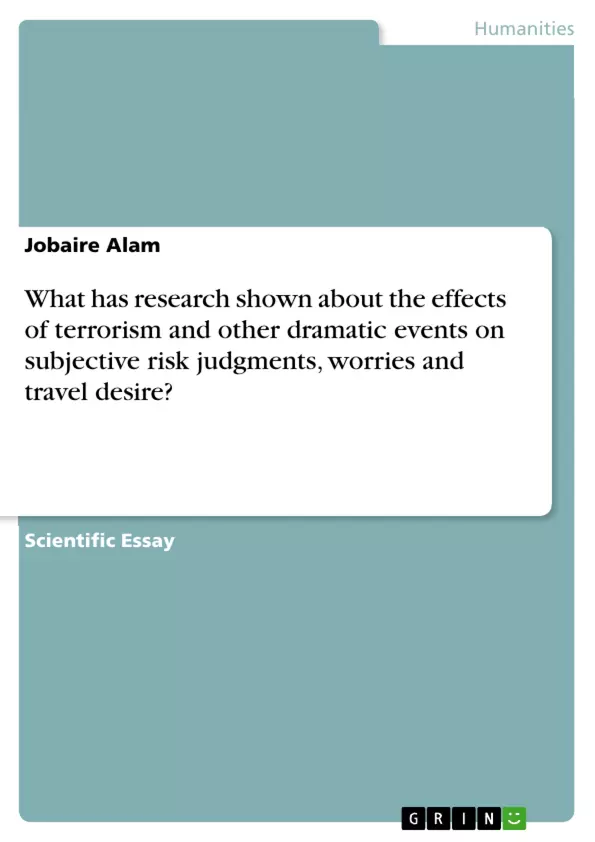The discussion topic “What has research shown about the effects of terrorism and other dramatic events on subjective risk judgments, worries and travel desire?” is a question of tourism social psychology. As terrorism is a threat for every individual issue, so it has a massive impact on tourism society. Again worry is a combination of fear and anxiety, therefore because of terrorist attacks and other dramatic events tourist minds become worried about safety. The tourists may start to consider about the risk factors of travelling to a particular destination and thus the willingness of touring might be affected too. By the support and assistance of the current researches, I would like to define the key terms. Then I would like to describe what the current researches have shown about the impact of terrorism and other dramatic events on subjective risk judgments, worries and travel desire.
Inhaltsverzeichnis (Table of Contents)
- Introduction
- Defining Terrorism and other dramatic events
- Defining subjective risk judgment, worries and travel desire
- Subjective risk judgment:
- Worry:
- Travel desire:
- Discussion on effects of terrorism and other dramatic events on risk judgments, worries and travel desire; what researches have shown us
Zielsetzung und Themenschwerpunkte (Objectives and Key Themes)
This paper examines the influence of terrorism and other dramatic events on tourists' perceptions of risk, worries, and travel desires. The study aims to define key terms and analyze existing research findings to understand how these events impact tourism behavior.
- The impact of terrorism on subjective risk judgments
- The relationship between dramatic events and tourist worries
- The effects of terrorism and other events on travel desire
- The role of risk perception in tourism decision-making
- The psychological dimensions of worry and its influence on travel behavior
Zusammenfassung der Kapitel (Chapter Summaries)
- Introduction: This chapter introduces the topic of terrorism's impact on tourism psychology, highlighting the importance of understanding how such events affect risk judgments, worries, and travel desires.
- Defining Terrorism and other dramatic events: This section delves into the definition of terrorism, emphasizing its political motivations and the sudden nature of terrorist acts. It also explores other dramatic events that can influence tourist behavior, such as natural disasters and political instability.
- Defining subjective risk judgment, worries and travel desire: This chapter provides detailed definitions of subjective risk judgment, worry, and travel desire. It explores the multifaceted nature of risk perception and the psychological dimensions of worry. The chapter also clarifies the concept of travel desire, emphasizing its role in influencing tourist behavior.
Schlüsselwörter (Keywords)
The key terms and concepts explored in this paper include terrorism, dramatic events, subjective risk judgments, worries, travel desire, risk perception, tourism psychology, and the influence of these factors on tourist behavior.
Frequently Asked Questions
How does terrorism affect subjective risk judgment in tourists?
Terrorism increases the perceived likelihood of danger, causing tourists to overestimate risks when choosing travel destinations based on sudden, dramatic events.
What is the difference between fear and worry in tourism psychology?
Fear is an immediate emotional response to a threat, while worry is a cognitive process involving anxiety and repetitive thoughts about potential future safety issues.
Can dramatic events like natural disasters impact travel desire?
Yes, any dramatic event that threatens safety can significantly decrease the willingness of individuals to tour a specific region or use certain modes of transport.
How do tourists decide where to go after a terrorist attack?
Decision-making is heavily influenced by risk perception; tourists often switch to destinations they perceive as "safe" or stable, avoiding areas with recent political instability.
What has research shown about the long-term effects of terrorism on tourism?
Research indicates that while travel desire may recover over time, certain destinations may suffer prolonged economic impacts due to lingering negative risk judgments.
- Citar trabajo
- Jobaire Alam (Autor), 2015, What has research shown about the effects of terrorism and other dramatic events on subjective risk judgments, worries and travel desire?, Múnich, GRIN Verlag, https://www.grin.com/document/413350



